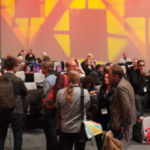 |
What Luna was looking for was an event for in-betweeners like herself — individuals and companies that already had a successful online presence, but wanted to grow and evolve their brand even further. Luna needed education on how she could push the envelope, increase the monetization of her blog, as well as network with big-name companies to forge successful partnerships.
And that’s when her KEEN (Keeping Entrepreneurs Engaged and Networking) Digital Summit was born.
THE RIGHT PLACE
Choosing a location was easy. Middle Tennessee-based Luna already had strong ties to Nashville, a centrally located city whose newly revamped downtown is famous for its live-music venues and burgeoning dining scene. And as an up-and-coming technology hub in the Southeast (Google recently announced that Nashville will be one of seven cities to make up its new network of tech hubs), Music City offered an ideal backdrop for KEEN, which took place Oct. 24-27, 2013 — especially when Luna heard that the Omni Nashville Hotel would be opening that fall.
In many ways, the 800-room Omni, adjacent to the equally new, 1.2-million-square-foot Music City Center, looked like the perfect venue for the neophyte event. Its well-thought-out 80,000 square feet of meeting space was designed for multiple groups to coexist without interference or interruption, and its rich menu of amenities included two full-service restaurants, a honky-tonk-themed bar and music venue, and full integration with the neighboring Country Music Hall of Fame and Museum.
But there was just one problem: Luna couldn’t actually see the completed hotel until a month before KEEN, when it opened on Sept. 30. “We were able to go on hard-hat tours, but it is difficult to envision [the event] without seeing the final product,” Luna said. “That was probably the biggest hurdle.”
Luckily, Luna only had to make a few minor changes to her meeting layout in the weeks leading up to KEEN. She could have chosen a smaller venue, but opting to hold KEEN at a downtown convention property meant that attendees were in easy walking distance of off-site evening events, restaurants, and the famous honky-tonks of Broadway. It also made logistical sense for a newbie planner. “Having an event like this at a hotel, especially a hotel with such incredible spaces and venues, made it easier,” Luna said, “because we had the support of the staff, the hotel’s banquet services, and even had someone assigned to us.”
THE RIGHT MIX
To separate KEEN from the herd of conferences and events that cater to digital entrepreneurs, Luna put an emphasis on quality over quantity, attracting a little less than 400 attendees to keep the program feeling intimate and focused. Without those qualities, Luna said, KEEN’s primary focus on successful networking would be lost. “What KEEN is about at its core,” she said, “is creating a space for people to collaborate, share ideas, and form new business relationships.”
 |
For about 18 months, Luna concentrated on attracting a broad base of attendees and speakers, from journalists, bloggers, and publicists to CEOs of local startups and representatives from international corporations. The overarching goal? Connecting those looking to make a name (or an even bigger name) for themselves in the digital sphere with experts and companies who could help them do it successfully. “A lot of it was tapping into my personal network that I’ve unintentionally cultivated over the past decade in the media industry,” Luna said.
“Scott [van Velsor, Luna’s husband and KEEN’s director of marketing and partnerships,] always said, ‘We need to do something to leverage your ability to network,’ and I always thought that was kind of silly. How do you build a business out of that? But that is sort of what happened, because so many of KEEN’s attendees were people I had met throughout the years.”
It’s this carefully curated crowd that gave KEEN the walk-right-up, non-intimidating atmosphere that Luna couldn’t find at behemoth events like the South by Southwest (SXSW) Interactive Festival. “It was very intimate in the best sense,” said Lana Dubovik Boissier, KEEN’s business development director, who described KEEN as “a community where people would feel comfortable interacting with each other. It felt like a reunion of people who had been meeting on a regular basis, more so than a first-time conference where most of the people had never met.”
To further encourage connection-making between attendees, Luna concentrated on setting a natural stage for networking, including lots of happy hours, VIP receptions, and opening- and closing-night parties. On the second evening, Luna threw a singer-songwriter night hosted by sponsor Country Music Television (CMT) at the Listening Room Café, a live-music venue a few blocks from the Omni Nashville. Over dinner and drinks, attendees got to know each other while listening to some of Nashville’s preeminent songwriters.
“It’s one thing to meet people under the bright lights of a ballroom during the day, but networking really happens over cocktails,” Luna said. “I wanted to get everyone out and about in the neighborhood. I have such a deep-rooted love for the city, and I thought it was important that the local businesses get a little love, too.”
THE RIGHT SUPPORT
Although Luna knew exactly what kind of conference she wanted to create, she had no idea how to go about doing it. And her experience with hotels and venues was similar — she’d often reviewed them as a travel writer, but had no clue about the inner workings of a hotel or how they operated from an events perspective. This is how Luna learned her first, and biggest, lesson. “If you don’t have the knowledge or skills to accomplish a task,” she said, “you find the right person to do it.”
Enter Boissier, owner of Los Angeles-based Hospitality Atelier, a consulting firm that specializes in sales and marketing for the hospitality industry. Boissier’s experience ranges from opening new hotels to sales and marketing, all of which helped in guiding Luna through the process of choosing host venues, negotiating with Omni, and logistics planning.
Luna relied on a four-person team, which demanded that everyone wear multiple hats. Events Director Kendall Gemmill originally was brought on to help with sales, but ended up using her experience in the liquor industry and connections with local venues and beverage brands to organize KEEN’s three evening events. She also lent a hand with the actual conference, suggesting speakers, liaising with sponsors, and helping out with every other possible component. “Working on a first-year event,” Boissier said, “there are very few areas you don’t get involved with.”
Luna also used her well-worn Rolodex to attract an impressive lineup of speakers and sponsors. Nashville Mayor Karl Dean kicked off the opening-night event along with Butch Spyridon, president and CEO of the Nashville Convention & Visitors Corp. Four tracks — technology, family and entertainment, travel and lifestyles, and food and spirits — attracted speakers like David Spiegel, Buzzfeed’s executive director of sales, and Adam Yeomans, bureau chiefforthe Associated Press. A total of 37 sponsors ranged from major companies like CMT and Fifth Third Bank to local businesses like Belle Meade Bourbon. For addi tional help and to keep operating costs down, Luna also brought in interns and asked friends and family to volunteer before and during KEEN.
THE RIGHT PRICE
To entice small businesses and freelancers like herself, Luna tried to make the cost of attending relatively low compared to other industry events. KEEN’s all-access pass cost about $300, and the group’s room rate at the Omni Nashville ran $179 per night. Comparatively, conferences like SXSW Interactive charge anywhere from $800 to $1,300 for an all-access pass depending on when attendees register.
“It wasn’t about numbers the first year, it was about quality,” Boissier said. “For Kristin, the content is much more important. It wasn’t about collecting a commission, there was a much broader expectation.”
Luna plans to cap attendance around the 600 mark next year as well as continue to keep prices low so almost anyone can afford to attend. She is also thinking about producing one-day KEEN pop-up events throughout the year as well as adding a tech-focused professional track to next year’s show so attendees can earn continuing education credits. Networking again will play a prominent role, and Luna wants to add speed-dating-style networking events to the mix.
“We will be implementing those into year two as an icebreaker on the first afternoon when people are trying to find their place in the conference and get to know others right off the bat,” Luna said. “We want to be the boutique alternative that allows people access. In the early days of SXSW, it was a little more like KEEN, where you could meet the CEOs and representatives from big consumer brands or media personalities, and actually sit down and have a conversation and have a drink.”
Looking back, Luna said she walked out of KEEN on cloud nine, feeling proud of what she and her team accomplished, and amped up for what’s to come. “We know now what we did wrong, what we want to improve on,” she said, “and we’re almost back to having a blank slate in terms of what we can do with the conference, which is scary and exciting at the same time.” She added: “I have an extreme appreciation for what meeting planners do now. It takes a village to put on an event.”
A KEEN Success
Daniel Bear Hunley is the kind of social-media superstar who epitomizes KEEN Digital Summit’s ideal demographic. Named one of Time magazine’s “Top 30 Style Pinners” in 2012, the freelance social-media consultant and online influencer spoke at KEEN on how companies can use Pinterest to promote and market their brand. “He is a good illustration of who we were going after and the collaboration that is taking place all over the digital media world,” said KEEN founder Kristin Luna.
Hunley is also a KEEN success story. After speaking at the event, he walked away with a new client. “I was speaking on how brands interested in Pinterest would have more success partnering with an influencer instead of slaving away at trying to create their own following,” Hunley said. “I mentioned my experience in men’s style, and little did I know that there was a man in the audience who was launching a new brand of craft denim called Grady Mac Denim Co.”
A week after KEEN ended, Hunley received a phone call from the company, and after submitting a proposal, Grady Mac Denim hired Hunley as its new brand manager. “That was very exciting for me,” Luna said. “He is a success story of what we’re all about.”



